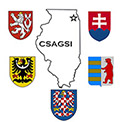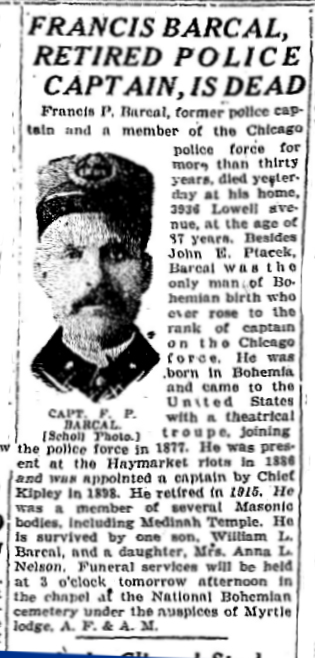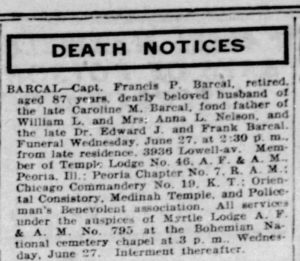Franz Barcal - First Bohemian Police Captain in Chicago
Early Director of Bohemian Theatre in Chicago
Franz Peter Barcal was born August 11, 1837 in Stozitz #11, Vodnany, Pisek, Bohemia. (Image - birth record - below) Many articles list his birth as August 11, 1841, and the “History of the Chicago Police”, list 1843, but neither appear to be the reality. (1)
Franz would not be the only member of this family to become a Chicago policeman. Brother, Jacob, born on July 20, 1839, also at Stozitz #11, would also join the force.
Father Matej of Stozitz #11, married mother Katerina, of Stozitz #13 in 1835. (2) (Record Image below)
Franz, his parents, Matej and Katerina, several siblings, John and Jacob, would arrive in the United States, live and work in the Chicago area.
Jon Habenicht lists Franz, and his father Matej, as being in Chicago in 1854. (3) The History of the Chicago Police Department lists Franz as arriving in September of 1853. (4)
The earliest record discovered so far is Franz’s marriage in 1862 in 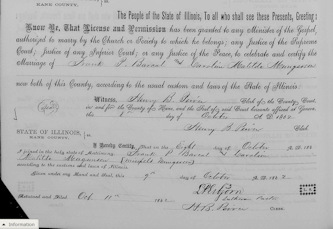 Kane County. On October 8th, Franz Peter Barcal married Caroline Matilda Mongerson (Magnusson) (last name has several spelling versions). (5) Caroline was born in Sweden, on November 9, 1844 in Edshult, Jenkoping. Caroline, parents; father, Jonas (John Find A Grave #131029504), mother Christina (Find A Grave #131029524), and siblings, departed Port Gothenburg on April 15, 1852 aboard the ship “Selma” and arrived at Port New York City on June 30, 1852.
Kane County. On October 8th, Franz Peter Barcal married Caroline Matilda Mongerson (Magnusson) (last name has several spelling versions). (5) Caroline was born in Sweden, on November 9, 1844 in Edshult, Jenkoping. Caroline, parents; father, Jonas (John Find A Grave #131029504), mother Christina (Find A Grave #131029524), and siblings, departed Port Gothenburg on April 15, 1852 aboard the ship “Selma” and arrived at Port New York City on June 30, 1852.
Caroline’s family is listed in the 1860 Census for Geneva, Kane County, on page 16. Caroline married Franz in 1862. A Lutheran pastor (Eckstrom) signed the marriage certificate. A Swedish Lutheran Church, Geneva Lutheran, was founded in 1853. A sister of Caroline’s, in 1863, also married in Kane County. In 1870, the Census lists parents and several siblings living in Knox County, Illinois. One brother, Samuel, has records indicating he was a member of the 43rd Illinois Infantry in the Civil War.
Chicago City Directories and Federal Census records provide some information on Frank and Caroline, their family and those of Frank’s parents and siblings.
1866 Directory – Frank Barcal 597 Larrabee, John 504 Larrabee both cigarmakers
1867 Directory (Ancestry) Jacob Barcal, cigarmaker , r. 597 Larrabee
1867 Directory Mathew Barcal, Lab. 597 Larabee
1869 Directory (Ancestry) Francis P. Barcal Cigarmaker, Joseph Dibos, 597 Larrabee
1869 Directory Jacob Barcal, cigarmaker, r. 504 LAEEvww
1869 Directory John Barcal, cigarmaker, Joseph Dibos, 597 Larrabee
1871 Directory Mat Barcal 597 Larrabee W16 M3 F3 Bohemia
1871 Directory Frank Barcal laborer R. 44 Burlington W7 M2 F2 Bohemia
1871 Directory Jacob Barcal Cigarmaker R 197 Larrabbee W16 M1 F2 Bohemia
1861 Directory (ancestry) only has Jacob Barcal Laborer H.C. Cloyes & Co.
1885 Directory Charles Barcal Cigarmaker 597 Larrabee, William Barcal Porter
Francis Police Sergt. W. chicago Ave Stateion house 41 keenon, jacob J. Police, house 1185 W. Washington
1873 Directory Jaob Barcal Swatck and Barcal r 522 Larrabee, John Barcal Cigarmaker 597 Larrabee, Joseph Barcal cigarmaker 597 Larabee, Matthew Barcal carpenter 597 Larrabee
1890 Directory (Ancestry)
Charles Barcal Cigarmaker 597 Larrabee
Francis Barcal Lieutenant Police, 689 Sheffield ave. Home 41 Keenon
Jacob J. Barcal Police h. 128 Dekalb
Matthew Barcal, laborer, h. 597 Larrabee
William Barcal, Conductor, h. 41 Keenon
1900 Directory (Ancestry)
Albert Barcal 409 W. 21st
Charles Barcal Cigarmaker 597 Larrabee
Edward J. Barcal Physician 1190 N Maplewood Ave
Francis P. Barcal, Capt. Police 12th Precinct, H. 697 N Claremont
John Barcal, Laborer, 837 Allport
John Barcal, Tailor, 776 Allport
Stephen Barcal, Laborer, 4724 S. Winchester
Thomas Barcal, Carpenter, 424 W. 18th,
William Barcal, Motorman, 41 Keenon
1870 Illinois, Cook, Chicago, Ward 9 Page 28 (7)
Frank Bartsal 32, Carrie 26, Willie 5, Annie 4 (Frank is a cigar maker)
1880 Illinois, Cook, Chicago, 164, Page 60, 100 Howe Street (8)
Frank Bartzel 38, Carrie 36, Wilie 14, Annie 12, Frank 10, Eddy 8 (Frank is a police officer)
1900 Illinois, Cook, Chicago, Ward 14, D0431, Page 12, 697 Claremont (9)
Francis P. Barcel 56, Carrie 44, Frank 27, Caroline (Niece) 7
1910 Illinois, Cook, Chicago, Ward 27, D1180 Page 44, 3936 N. Lowell (10)
Francis P. Barcal 69, Carrie M. 63, Dr. Edward J. (D) 38, Mrs. Annie Nelson (Daughter) (D) 36, Roy J. Nelson (Grandson) 21 John Nelson (Grandson) 14, Edward J. Barcal (Grandson) 12
1920 Illinois, Cook, Chicago, Ward 27, D1657, Page 12, 3936 N. Lowell (11)
Francis P. Barcal 81, Anna L. Nelson 48, Howard L. Nelson 30, John W. Nelson 24, Margeret Johnson 8
Early Chicago City Directories and census records show Francis had several occupations, but they do miss an important one for him.
Francis Barcal was one of the earliest actors and directors of Bohemian Theatre and Bohemian plays in Chicago. In February of 1863, using a German Turner Hall, the Bohemians put on their first play in Chicago. Francis Barcal was acting. In 1869, Barcal became the director of the Slovenska Lipa, which continued to stage plays and performances for its Bohemian Audiences.
An article in the newspaper Denni Hlasatal, celebrating fifty years of Bohemian plays and performances in Chicago describes Barcal: “As examples let us recall "Dva Sirotci" (Two Orphans) and "Nevinne Odsouzen" (Sentenced, but Innocent), which last was played here under the more literally translated title "Slavna Pravni Pre" (The Famous Court Trial). There were others that do not come to mind just now. The two plays mentioned were translated by one of the earliest Chicago amateurs, Captain Barcal, who in the years of his activity translated enough plays to fill a year's 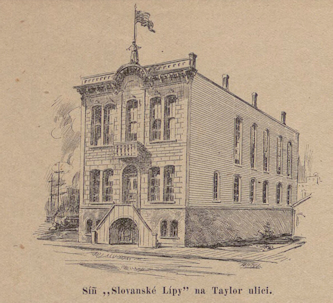 repertoire. Among them were also a number of American plays which are no longer considered shining examples of dramatic literature but which were very popular many years ago.” (12)
repertoire. Among them were also a number of American plays which are no longer considered shining examples of dramatic literature but which were very popular many years ago.” (12)
On October 9, 1871, Frank Barcal was directing the performance of “Orphan of Lowood” at the Slovenska Lipa, when the Chicago Fire began its approach. He helped remove the audience from the building and with the help of others protected the building and nearby area from the fire. In 1875, with the help of others, like T.J. Sokol, he participated in the creation of the Czech choir “Thalia”. As previously mentioned, Barcal translated many plays for use by Czech theatre. One was the “The Last Mohican”, and Barcal played the role of chief of the Narragansett tribe. When Barcal became a member of the Chicago Police, his continued involvement on the theatre stage was not something the police department would like. But Barcal continued under a different name to attract less attention. Czech theatre supporters did know that when the name Stozicky was listed as a cast member, it was really Barcal. A. E. Benes became Barcal’s stand in when his duties with the police prevented him from making it to the theatre for a performance." (13)
(Image Slovenska Lipa -Dejiny Cechuv Americkych”, Jan Habenicht, St. Louis, 1904, Page 591.)
Additional Information on the Slovanska Lipa is from an excerpt of an article in the Denni Hlasatel of February 23, 1913.
"On these modest beginnings, important and widespread national activities were built. During the very first year, the first Bohemian hall in Chicago was erected, the old Slovanska Lipa (Slavonic Linden Tree) at Clinton and Van Buren Streets. This early building had a decent stage. There was not more than $300 in the treasury at that time, an the building cost $3,500. But our patriots overcame all such obstacles easily. In two years the debt was paid, and the first Bohemian hall in Chicago was perhaps also the first one to be free of debts. In those days it was the center of all national life, and it will be of interest to note that the historical Bohemian-Slavonic convention of fifty delegates of all the Slovanske Lipy in existence at that time was held here....
In 1867 the old Lipa at Van Buren Street burned down, and in 1869 building activities were started on a new hall at Taylor Street between Canal and Beach Streets. This latter street has long since been absorbed by the tracks of railway companies. The hall was the property of the Slovanska Lipa, and the Telocvicna Jednota Sokol (Sokol Gymnastic Union) was a branch of the Lipa until 1871. Thereafter it became independent. The first performance in the new hall was "Sobeslav, Knize Selsky" (Sobeslav, The Peasant Duke). In 1871, on the day of the great Chicago fire "Sirotek Lowoodsky" (The Orphan of Lowood) was being given....when a little girl--later one of the foremost amateur actresses--came running into the hall shouting, "Fire"! She announced the terrible catastrophe which befell our city. The Lipa was saved, but later on it met a similar fate--it was destroyed by fire just twenty years ago last Christmas; and today it is difficult, even for the oldest settlers, to find the site of the second Bohemian hall in Chicago.
The Slovanska Lipa and the Cesko-Americky Sokol hall were the scenes of many a theatrical success. They educated innumerable amateurs who in turn were founding new theatrical societies which, some twenty-five years ago, were at the height of their worthwhile activities. Here we must mention the amateur theatrical society Thalia which was founded in 1874 and was active without interruption until the time of the final decline of amateur theatricals in the Pilsen district. In 1889 Thalia celebrated its fifteenth anniversary and presented on that occasion Subert's "Probuzenci"(Those Who Have Awakened) under the direction of C. V. Jerabek. Many an old Bohemian amateur participated in this performance.
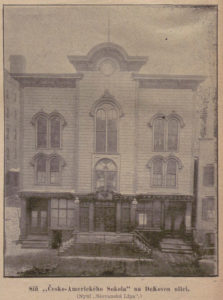 The hall of the Cesko-Americky Sokol (Bohemian-American Sokol) on De Koven Street, the Slovanska Lipa of our days, was built in 1869. It is now the oldest Bohemian public building in Chicago. It probably is not a very great mistake to say that the Cesko-Americky Sokol hall is perhaps the oldest piece of existing Bohemian property in this city. It was dedicated July 1, 1869, and since then it has been used, almost without interruption, for amateur theatricals. A handful of theatrical pioneers still keep faith with their old love and give plays occasionally in the old hall, notwithstanding the fact that it is almost entirely out of reach of the Bohemian center and does not meet with modern theatrical requirements. Perhaps it is out of piety toward the cradle of the Bohemian theatre, so to speak, that the Sokol hall is still the headquarters of the old amateurs, and that it is the site of this year's anniversary celebrations.
The hall of the Cesko-Americky Sokol (Bohemian-American Sokol) on De Koven Street, the Slovanska Lipa of our days, was built in 1869. It is now the oldest Bohemian public building in Chicago. It probably is not a very great mistake to say that the Cesko-Americky Sokol hall is perhaps the oldest piece of existing Bohemian property in this city. It was dedicated July 1, 1869, and since then it has been used, almost without interruption, for amateur theatricals. A handful of theatrical pioneers still keep faith with their old love and give plays occasionally in the old hall, notwithstanding the fact that it is almost entirely out of reach of the Bohemian center and does not meet with modern theatrical requirements. Perhaps it is out of piety toward the cradle of the Bohemian theatre, so to speak, that the Sokol hall is still the headquarters of the old amateurs, and that it is the site of this year's anniversary celebrations.
The Slovanska Lipa and the Cesko-Americky Sokol hall were the scenes of many a theatrical success. They educated innumerable amateurs who in turn were founding new theatrical societies which, some twenty-five years ago, were at the height of their worthwhile activities. Here we must mention the amateur theatrical society Thalia which was founded in 1874 and was active without interruption until the time of the final decline of amateur theatricals in the Pilsen district. In 1889 Thalia celebrated its fifteenth anniversary and presented on that occasion Subert's "Probuzenci"(Those Who Have Awakened) under the direction of C. V. Jerabek. Many an old Bohemian amateur participated in this performance." (14)
(Image Slovanske Lipa – Duch Casu, Chicago, Vol 23 Issue5 Pages 68- 69.)
Several years after the death of Captain Barcal, A.E. Benes, writing in the 1925 edition of the Amerikan Kalendar, provided additional insights on the theatrical career of Francis Barcal.
(Translated using Google Translate)
"Captain Barcal left behind the memory of one of the first awakens of our local national life, a sincere encouragement and trainer, and certainly one of our most deserving amateurs at a time when amateur theater was the most important factor in our national life.
František P. Barcal was born in the Vodňany region in Stožice in 1837 and at the age of eighteen he came to America with his parents in 1855. They settled in Chicago, where František learned cigar and worked for Mr. Poláček on Jefferson and DeKoven streets for a long time. At that time he met our amateurs, such as: Anton Jurka, V. Morávek, Jan Košický, J. K. Šisler, Jan Preuss and with his love he gained the friendship of all. In a short time he performed on the Czech stages in Chicago. In the 60s-70s he was already in the main roles.
At that time, there was little fun in our Chicago and times were very tense, due to very low wages and a lack of work. But still, our people met in Slovanská Lípa and the Czech-American Sokol to have fun after hard work and to strengthen themselves for further work. František Barcal gained an abundance of friends both in the theater department and in federal and private life. Each time he performed in a larger role, each co-performer considered it an honor to be able to perform. That's why it was always played with enthusiasm and joy, and Barcal was recognized everywhere as the leader, and his name on the poster always meant a crowded hall, good interplay, and the happiest mood and contentment.
And so it went until the time of the great fire, when Barcal proved to be a true hero and helped save a lot of property and maintain order. He conducted with Mr. Němeček, at that time the chairman of Těl. Poison. Sokol, the rescue work of the Slovanská Lípa building and he managed, but with the help of many other compatriots, to defend the building as well as the surrounding property. On that fateful evening of October 9, 1871, the performance "Orphan of Lowood" was given, which was directed by Mr. Barcal. He could be thanked that when leaving the hall crowded with audiences, there was no panic and no misfortune, as everyone descended the stairs with calm balance.
In 1875, together with the leading amateurs by T. J. Sokol, he founded the drama choir "Thalia", and it is safe to say that at that time the Czech theater in Chicago was at the highest level of perfection. Needless to say, the reasons that led to the founding of the club were mentioned here, but they were the best forces that acted in Jednota and gathered under Barcal's leadership into a powerful drama choir, and the better association of amateur Czech Chicago had not been before or since. If we list only some of the games that were played with great success at the time, the reader will get a good idea of the training of the then amateurs belonging to Thalia. Thus, Zákrejs's "Poděbradovna", in which Barcal played the role of Matyáš uherský, Hálek's "Záviš", was successfully performed (Barcal in the role of Otakar II., The title role was in the hands of F. Kosák), "Záhuba rodu Přemyslovců" , (Barcal as Vršovec), "Aria and Messalina", (Barcal in the role of Palta). Barcal also counted Žižka in Kolár's play "Žižek's Death" to his great tasks. At that time, Barcal also translated several plays from English, and since he devoted special studies to the performances of English actors, he also excelled in them. He was directly unsurpassed in the tasks of these. Thus he translated the piece "White Slave", in which he played the masterfully raw planter McCloskey, the piece "The Last Mohican", Barcal as chief of the Naragansett tribe; he also translated the sensational drama "Two Orphans", in which he celebrated true triumphs in the role of Jaques. Encouraged by the success of his translations on our stage, he also tried the original work, and prepared the play "The Last Táborita" for the stage, based on Herloš's novel of the same name, in which he played the role of Jaroslav. V. Lenoch, who has already died, also played the role of Sokol.
The love with which Barcal clung to Czech theater is also proved by the fact that when in later times the police service did not allow him to work in the theater, he often performed under the name Stožický and since everyone knew from Chicagoans who was hiding behind that name appeared on the program, great interest in the theater was already aroused. It happened many times, however, that unexpected service thwarted his performance, but there was usually an amateur who spoke for him.
Mr. Barcal's deputy in roles when he could not be played was the writer of this A. E. Beneš, which shows how good friends they were. Every promotion and award of Mr. Barcal meant a kind of recognition for us Czechs and every such event was duly celebrated. Everyone proudly proclaimed: Our Barcal had been promoted again, but he also deserved it. Of course, there were people who envied Barcalo's achievements and could not harm him otherwise, making sure that his performances knew about every performance on stage."
In the same article, A. E. Benes, also summarized Barcal's police career.
In 1877, Barcal became a member of the city police and was first assigned to West Chicago Avenue Station. In two years he was promoted to patrol sergeant (Patrol Sergeant) and in the fourth year of service he was appointed a regular sergeant. At that time he was already married and the father of four children. Two of them were alive at the time of his death, his son William В. Barcal and daughter Anna L. Nelson. Two sons and a wife preceded Mr. Barcal for eternity. In 1886, Mr. Barcal was assigned to the station at 12th and Johnson Street, from where he supervised the Czech settlements and was appointed Lieutenant for excellent service. Here he played the greatest role of his life in 1886 during the workers' riots.
In early 1886, Chicago was disrupted to the highest degree; the work was scarce and the salary poor. Spring was coming and no work had opened yet. Everyone knew something unprecedented was coming. The city was flooded with agitators, those who wanted to help the workers and those who wanted to benefit from the unfortunate position of the workers. One meeting caught up with the other, and almost daily, the police demanded protection from the owners of shops and property for protection, so that police power had to be divided into small groups ready for command or immediate calling. After several months of such grueling service, a smiling police officer could not be found, and some reported medical leave. And here again Mr. Barcal showed himself a good expert in character. He went around the groups of his team and always spoke to them in an amicable sense and gained such trust that he was given the name "Peace maker". Everywhere he advised sensibly but strictly to the protection of property, but at the same time to the investigation of citizens' rights and to the conduct of the police department with dignity. His teachings proved successful in the great clash of the people with the police, where despite the fact that the people were upset and firing, no one was shot by the police and yet it proved that only vigorous behavior can maintain respect for law and order.
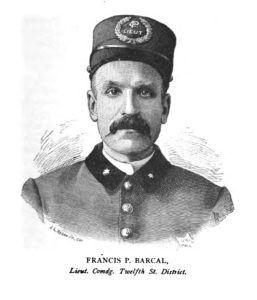 The year 1887 brought with it a strike of employees on the street railways. Barcal was assigned with his unit to patrol a stake on West Chicago Avenue. After several days of patrolling the sheds, the strikers' organizations decided to end the strike by violence and destruction of property. When Lieutenant Barcal heard this, he called his team and said to them, “Men, remember that among the people in the crowds representing the strikers, there is also a wretch who wishes to see blood so that guilt can be brought to the police. But there are also the male fathers of families in the crowds, who were driven into the strike by the poor wages. They are expected to feed and protect their children, but are not given the opportunity to earn enough to provide for their families. Therefore, do your duty with the utmost prudence. Strictly keep the illegal element in check and differentiate between those who invoke fair and decent wages and those who maliciously interfere with the unrest. Prove to Chicago, if the outdoor patrols were manned by us, that it would be a few days after the strike. Act sensibly. Those who are not employed by the dear have nothing to look for here. "
The year 1887 brought with it a strike of employees on the street railways. Barcal was assigned with his unit to patrol a stake on West Chicago Avenue. After several days of patrolling the sheds, the strikers' organizations decided to end the strike by violence and destruction of property. When Lieutenant Barcal heard this, he called his team and said to them, “Men, remember that among the people in the crowds representing the strikers, there is also a wretch who wishes to see blood so that guilt can be brought to the police. But there are also the male fathers of families in the crowds, who were driven into the strike by the poor wages. They are expected to feed and protect their children, but are not given the opportunity to earn enough to provide for their families. Therefore, do your duty with the utmost prudence. Strictly keep the illegal element in check and differentiate between those who invoke fair and decent wages and those who maliciously interfere with the unrest. Prove to Chicago, if the outdoor patrols were manned by us, that it would be a few days after the strike. Act sensibly. Those who are not employed by the dear have nothing to look for here. "
The advice was fully appreciated two days later when crowds of people tried to destroy carts and burn sheds. Here Barcal proved that among the sixty arrested, only four were real streetcar employees, and the others were a mob who wanted to break the strike and hurt the whole. Among these, enough incentives were taken from society to cause greater destruction and force the city to take ruthless action against the strikers. Barcal had a great deal of credit for not making more people victims of the unfortunate riots.
The advice was fully appreciated two days later when crowds of people tried to destroy carts and burn sheds. Here Barcal proved that among the sixty arrested, only four were real streetcar employees, and the others were a mob who wanted to break the strike and hurt the whole. Among these, enough incentives were taken from society to cause greater destruction and force the city to take ruthless action against the strikers. Barcal had a great deal of credit for not making more people victims of the unfortunate riots." (15)
(Image - Lieutenant F. Barcal - “History of the Chicago Police”, John Joseph Flinn and John Elbert Wilkie, Chicago 1887, W. B. Conkey, Chicago, Page 108.)
Over the course of Barcal’s career as a Chicago policeman, the Chicago newspapers mentioned him a number of times:
May 4 to 5, 1886 – Francis Barcal and his brother, Jacob, both Chicago police officers were in action during the Haymarket riots. Jacob Barcal, was a patrolmen of the Desplaines Street Station, under the command of Lieutenant Beard. They, and other groups of police, were tasked with guarding the passage from Haymarket Square, Randolph and Desplaines Streets. They experienced an explosion and gunfire, with several injuries. (16) Lieutenant Francis Barkal, of the Twelfth Street Station, led a patrol of officers through the streets during the course of the day to disperse the large crowds, mostly without major incidents. (17)
July 3, 1886 – “A Police Officer’s Reward. Lieutenant Francis P. Barcal, of the Second Police Precinct, was last night made the recipient of a valuable gold star with a fine diamond set in the center as a testimonial from the residents of the precinct of their appreciation of his meritorious services during the late riots. The presentation was made at No. 76 West Taylor Street in an appropriate speech by Mr. Joseph F. Kohout, and Lieutenant Barcal, who had no previous knowledge of the Intentions of his friends, responded in happy terms” (18)
August 30, 1890 – Lieutenant Barcal, on Larrabee Street, at one o’clock in the morning, saw two men running. He called for them to halt, but one drew a revolver and shot Barcal in the leg. His wound was attended to by Dr. Miller and Barcal went home to 41 Keenon Street. (19)
July 6, 1891 – Lieutenant F.P. Barcal was shot while on street patrol. He intervened in a burglary at Halberg’s saloon. Other officers, later, caught the suspects. The articles ends with; “He has the reputation of being one of the bravest and best officers." (20)
August 30, 1893 - Paid out her money to lift a charm - Katie Denihan Tells of an Experience with a Fortune-Teller. Katie Denihan, a domestic employed at No. 382 Ontario Btreet, called on Lieut. Barcal of the East Chicago Avenue Station last night and told him of a $27.50 experience she had had with a fortune-teller. She said that she came from Philadelphia several months ago, where she left a sweetheart named George. Three weeks ago a strange woman called at her house and surprised her by saying that George was unfaithful to her. She told Katie that he was under a " spell " cast by a young woman with blonde hair. Katie instantly recalled a former rival w ho had blonde hair, and she invited the woman in to tell her more. The woman told Katie so much ancient history, or Katie thought she did, that she became convinced that her love affair was in a bad way. The woman said that for 30 she would remove the ' charm.' Katie thought the price cheap enough, but unfortunately had but $10. She gave the woman the $10. The next day the woman called again and said the " charm " refused to be lifted tor so little money, Katie borrowed $5 and gave it to the woman for her lover's release. But this did not do the work and Katie continued to give the woman money until she had given up $27.50. Then the woman left to come no more. Several other servant girls in the neighborhood also employed the woman to remove various " charms " which failed to move. Lieut. Barcal gave Katie some good advice and promised to look for her $27.50. (21)
March 12, 1895 – Four geese were placed in a cell at the Maxwell Street Police Station. Two police officers had rounded them up the evening before, citing that two boys had left the geese and they were causing problems for the Chicago and Alton Railway. Two court justices holding session at the station were being interrupted in their proceedings in the station from the constant noise made by the geese. Captain Barcal eventually rounded them up and took the geese to the city pound. “Attorney Epstein offered to furnish bonds for the good behavior of the geese, if released in his custody, but Captain Barcal would not accept it, having heard that roast goose is one of Epstein’s favorite dishes.” (22)
June 25, 1895 - Claims the house is haunted - Fritz Flohr Tells of Midnight Horrors in a La Salle Avenue Structure. Ghosts, goblins, processions of headless bodies, and illusion tricks by phantom forms have not caused Fritz Flohr's hair to turn gray in a single night, because it is already gray, but he has hunted up a new boarding place and no longer lives at No. 219 La Salle avenue. Yesterday morning Fritz came into the East Chicago Avenue Police Station and asked Lieut. Barcal for police protection, saying that his room was haunted and that every night at 12 apparitions made their appearance, as if acting a Greek tragedy or rehearsing a long-forgotten crime. Two weeks ago Mr. Flohr rented a room on the third floor at No. 219 La Salle avenue and all went well until a few nights ago, when he says, he was awakened at midnight. Numberless headless bodies danced, as if in a dress rehearsal for some ghostly ballet. They appeared and disappeared with startling suddenness. The next night at 12, Fritz says, he was awakened by the quilts and pillows being pulled off his bed. They were replaced by him only to be pulled off again. That night he camped on the front doorstep until daylight. The third night was too much for him, and with weak Knees and trembling voice he determined to seek protection from the police. (23)
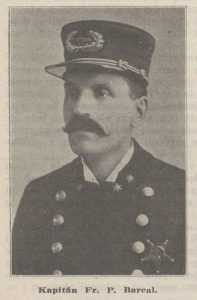 February 10, 1897 – Captain Barcal, with help from a citizen, was able to direct his police officers to apprehend members of the “Pickles” Gang. The gang members were responsible for a number of robberies of saloonkeepers within Barcal’s district. (24)
February 10, 1897 – Captain Barcal, with help from a citizen, was able to direct his police officers to apprehend members of the “Pickles” Gang. The gang members were responsible for a number of robberies of saloonkeepers within Barcal’s district. (24)
April 4, 1904 – The Chicago Tribune announced Captain Barcal of the West Chicago Avenue Police District, has undertaken three crusades to enforce open and closing hours for saloonkeepers, to arrest spitters, and halt dealers who sell cigarettes without licenses. A number of arrests and fines have been recorded. (25)
September 3, 1907 – Captain Barcal, of the Chicago Avenue Station, received a request for help from a music professor. The professor’s wife had accumulated ten cats, and with that a large monthly milk bill. He claimed alienation of attention, and the crowded conditions caused by the cats filling the rooms. Captain Barcal did not appear to have a good solution to this request. (26)
(Image Captain Barcal - Amerikan Kalendar, August Geringer Publisher, Chicago, 1925, article by A.E. Benes, Pages 292 to 294.)
January 17, 1908 – While Captain Barcal, East Chicago Avenue Station, is getting closer to retirement, he still made the headlines. A letter came to the police station warning the Captain that his work against a gang of Italian blackmailers had earned him a death threat. (27)
Census records available for Francis and Caroline “Carrie” Barcal and family list with each record, children, at first single, then married or divorced, living at home. The 1910 census lists Barcal as an Ex Captain of Chicago Police. In July of 1914 his wife, Caroline, died. A. E. Benes, in an article describing the life of Francis Barcal, remarked that retirement and then the death of his wife, wore on the retired captain. In 1920, he was living with one of his children. Francis Barcal died on June 25, 1923, and is buried in Chicago’s Bohemian National Cemetery, with his parents, wife and several children.

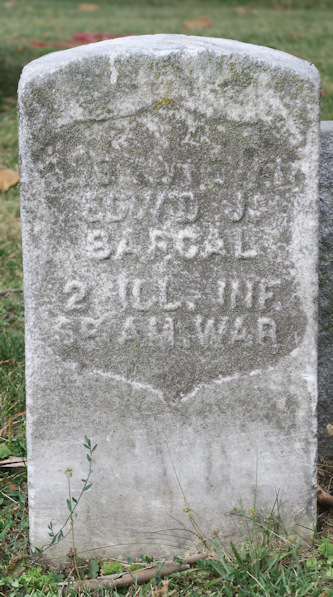
Image Above - Buried in Lot 4 Block 3 Section L (Find A Grave #)
(Photos by author)
(210417235) Father of Francis - Matej "Matthew" Barcal - Death Address - 597 Larrabee
(189609249) Mother of Francis - Katerina Barcal - Death July 1893 - Death Address - 597 Larrabee
(125751664) Francis Peter Barcal - June 1923, Captain Chicago Police Department - Death Address 3936 Lowell
(125754528) Wife of Francis - Caroline Barcal - July 1914, Death Address 3936 Lowell
(125752068) Son of Francis and Caroline - Edward Barcal 1920 - Edward was a veteran of the Spanish American War. (Headstone image left)
(189609466) Son of Francis and Caroline - Frank Barcal 1906
References
(1) https://digi.ceskearchivy.cz/8442/104/2371/1677/28/0
(2) Marriage Record 1835 Storitz Book 37 Image 23 Vodnanay, Strakonice, Pisek, Matej Barcal, Storitz 11, Katerina Storitz 13.
(3) Dejiny Cechuv Americkych”, Jan Habenicht, St. Louis, 1904, Page 570
(4) History of the Chicago Police”, John Joseph Flinn and John Elbert Wilkie, Chicago 1887, W. B. Conkey, Chicago, Page 503.
(5) "Illinois, County Marriages, 1810-1940," database with images, FamilySearch (https://familysearch.org/ark:/61903/1:1:KFL2-GFT : 15 October 2017), Frank P. Barcal and Caroline Matilda Mongerson, 08 Oct 1862; citing Kane, Illinois, United States, county offices, Illinois; FHL microfilm 1,481,108.
(6) Ancestry.com. U.S., Evangelical Lutheran Church in America, Swedish American Church Records, 1800-1947 [database on-line]. Lehi, UT, USA: Ancestry.com Operations, Inc., 2017.
(7) Year: 1870; Census Place: Chicago Ward 9, Cook, Illinois; Roll: M593_204; Page: 14B; Family History Library Film: 545703
(8) Year: 1880; Census Place: Chicago, Cook, Illinois; Roll: 197; Page: 257A; Enumeration District: 164
(9) Year: 1900; Census Place: Chicago Ward 14, Cook, Illinois; Page: 6; Enumeration District: 0431; FHL microfilm: 1240262
(10) Year: 1910; Census Place: Chicago Ward 27, Cook, Illinois; Roll: T624_270; Page: 22B; Enumeration District: 1180; FHL microfilm: 1374283
(11) Year: 1920; Census Place: Chicago Ward 27, Cook (Chicago), Illinois; Roll: T625_340; Page: 6B; Enumeration District: 1657
(12) Denni Hlasatel Newspaper, Chicago, November 14, 1915 “Our Theater Now and in the Past”.
(13) Amerikan Kalendar, August Geringer Publisher, Chicago, 1925, article by A.E. Benes, Pages 292 to 294.
(14) "A Festival of Bohemian Theatricals Celebration of Fiftieth Anniversary of First Bohemian Theatrical Performance in Chicago", Denní Hlasatel, 23 February, 1913.
(15) Amerikan Kalendar, August Geringer Publisher, Chicago, 1925, article by A.E. Benes, Pages 292 to 294.
(16) Political History of Chicago 1837 – 1887”, M.L. Ahern, Donohue &Henneberry, 1886, Page 250.
(17) Article “A Deadly Socialist”, The Chicago Tribune, Chicago, May 6, Page 2.
(18) The Inter Ocean, Chicago, July 3, 1886, Page 6.
(19) The Chicago Tribune, Chicago, August 30, 1890, Page 1.
(20) The Inter Ocean, Chicago, July 7, 1891, Page 7.
(21) The Chicago Tribune, Chicago, August 30, 1893, Page 5.
(22) The Chicago Tribune, Chicago, March 12, 1895, Page 8.
(23) The Chicago Tribune, Chicago, June 25, 1893, Page 6.
(24) “Pickles Gang In Net”, The Chicago Tribune, February 10, 1897, Page 7.
(25) “Has Three Crusades”, The Chicago Tribune, Chicago, April 4, 1904, Page 1.
(26) “Cats Annoy The Professor”, The Chicago Tribune, Chicago, September 3, 1907, Page 3.
(27) “Woman Writes of Murder Plotted by Italian Band”, The Chicago Tribune, Chicago, January 17, 1908, Page 1.
